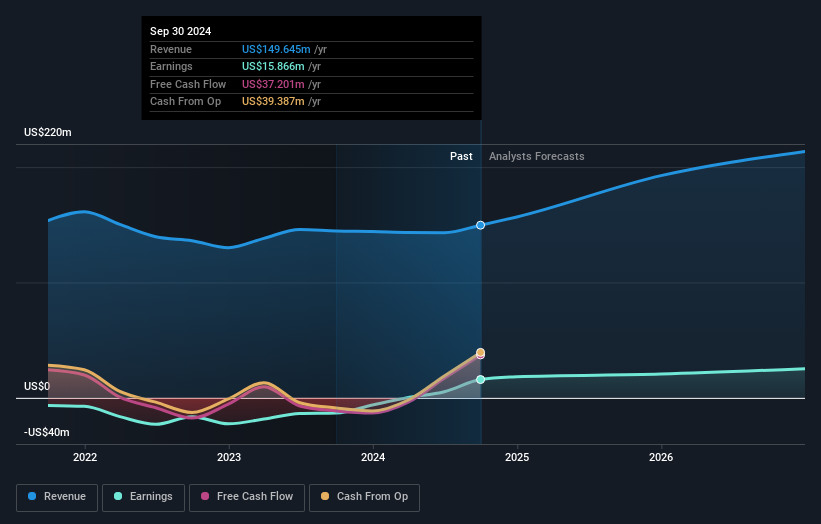- United States
- /
- Insurance
- /
- NasdaqCM:KINS
Kingstone Companies, Inc.'s (NASDAQ:KINS) 11% loss last week hit both individual investors who own 54% as well as institutions

Key Insights
- Kingstone Companies' significant individual investors ownership suggests that the key decisions are influenced by shareholders from the larger public
- The top 25 shareholders own 42% of the company
- Insiders have bought recently
Every investor in Kingstone Companies, Inc. (NASDAQ:KINS) should be aware of the most powerful shareholder groups. With 54% stake, individual investors possess the maximum shares in the company. In other words, the group stands to gain the most (or lose the most) from their investment into the company.
While institutions, who own 26% shares weren’t spared from last week’s US$22m market cap drop, individual investors as a group suffered the maximum losses
Let's take a closer look to see what the different types of shareholders can tell us about Kingstone Companies.
See our latest analysis for Kingstone Companies

What Does The Institutional Ownership Tell Us About Kingstone Companies?
Institutional investors commonly compare their own returns to the returns of a commonly followed index. So they generally do consider buying larger companies that are included in the relevant benchmark index.
Kingstone Companies already has institutions on the share registry. Indeed, they own a respectable stake in the company. This implies the analysts working for those institutions have looked at the stock and they like it. But just like anyone else, they could be wrong. If multiple institutions change their view on a stock at the same time, you could see the share price drop fast. It's therefore worth looking at Kingstone Companies' earnings history below. Of course, the future is what really matters.

We note that hedge funds don't have a meaningful investment in Kingstone Companies. Looking at our data, we can see that the largest shareholder is Barry Goldstein with 7.4% of shares outstanding. For context, the second largest shareholder holds about 5.0% of the shares outstanding, followed by an ownership of 3.8% by the third-largest shareholder. Furthermore, CEO Meryl Golden is the owner of 1.0% of the company's shares.
A deeper look at our ownership data shows that the top 25 shareholders collectively hold less than half of the register, suggesting a large group of small holders where no single shareholder has a majority.
While it makes sense to study institutional ownership data for a company, it also makes sense to study analyst sentiments to know which way the wind is blowing. While there is some analyst coverage, the company is probably not widely covered. So it could gain more attention, down the track.
Insider Ownership Of Kingstone Companies
The definition of company insiders can be subjective and does vary between jurisdictions. Our data reflects individual insiders, capturing board members at the very least. The company management answer to the board and the latter should represent the interests of shareholders. Notably, sometimes top-level managers are on the board themselves.
Insider ownership is positive when it signals leadership are thinking like the true owners of the company. However, high insider ownership can also give immense power to a small group within the company. This can be negative in some circumstances.
Our information suggests that insiders maintain a significant holding in Kingstone Companies, Inc.. Insiders have a US$38m stake in this US$192m business. This may suggest that the founders still own a lot of shares. You can click here to see if they have been buying or selling.
General Public Ownership
The general public, who are usually individual investors, hold a substantial 54% stake in Kingstone Companies, suggesting it is a fairly popular stock. With this amount of ownership, retail investors can collectively play a role in decisions that affect shareholder returns, such as dividend policies and the appointment of directors. They can also exercise the power to vote on acquisitions or mergers that may not improve profitability.
Next Steps:
While it is well worth considering the different groups that own a company, there are other factors that are even more important. Case in point: We've spotted 1 warning sign for Kingstone Companies you should be aware of.
Ultimately the future is most important. You can access this free report on analyst forecasts for the company.
NB: Figures in this article are calculated using data from the last twelve months, which refer to the 12-month period ending on the last date of the month the financial statement is dated. This may not be consistent with full year annual report figures.
Valuation is complex, but we're here to simplify it.
Discover if Kingstone Companies might be undervalued or overvalued with our detailed analysis, featuring fair value estimates, potential risks, dividends, insider trades, and its financial condition.
Access Free AnalysisHave feedback on this article? Concerned about the content? Get in touch with us directly. Alternatively, email editorial-team (at) simplywallst.com.
This article by Simply Wall St is general in nature. We provide commentary based on historical data and analyst forecasts only using an unbiased methodology and our articles are not intended to be financial advice. It does not constitute a recommendation to buy or sell any stock, and does not take account of your objectives, or your financial situation. We aim to bring you long-term focused analysis driven by fundamental data. Note that our analysis may not factor in the latest price-sensitive company announcements or qualitative material. Simply Wall St has no position in any stocks mentioned.
About NasdaqCM:KINS
Kingstone Companies
Through its subsidiary, provides property and casualty insurance products to individuals in the United States.
Reasonable growth potential with proven track record.


